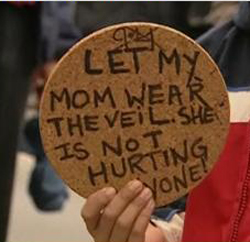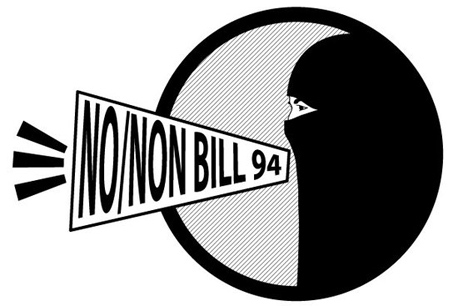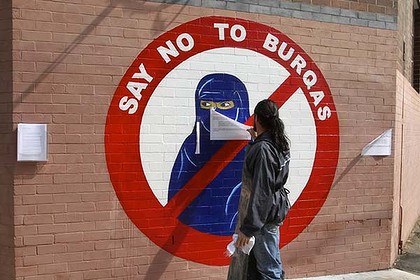A Muslim teacher has been dismissed from work in France for refusing to remove her Islamic Hijab or shake hands with male colleagues due to her religious beliefs. The school’s disciplinary committee which expelled her says it was defending secularism in public schools. The teacher had just started apprenticeship at a primary school in Toulouse.
Category Archives: Hijab
Turin: official calls for veil-wearing mothers to be banned from picking up their children from school
A government official in industrial northern Italian city of Turin has asked the local school board to stop fully-veiled women from picking up their children at school because it makes it difficult to identify them as the students’ true parents.
The request by Maurizio Marrone – a member of prime minister Silvio Berlusconi’s conservative People of Liberty party – was prompted after Marrone and other mothers had seen some women dressed in full burqas picking up their children from an elementary school in Turin’s Barriera di Milano working class neighbourhood.
“Some mothers with children enrolled in the Albert Sabin elementary school in Turin have seen Islamic women wearing the full burqa picking up their children, and I have seen this as well,” Marrone said, adding that the burqa made it impossible for teachers to “verify the identity” of those picking up minors.
Marrone went on to call the wearing of the burqa, the traditional dress of fundamentalist Islamic women, “damaging to the dignity of women.” Marrone also claims the burqa “slows down the process of integration” for immigrants.
Complaint lodged over Sydney burqa mural
It has become a lightning rod in the public debate about the right of Muslim women to wear the burqa, attracting protests, the censure of a mayor and messages of support from talkback radio. But now the Newtown mural of a woman in a full-face Muslim covering with a strike symbol over her face and the words ”Say No to the Burqa” is the subject of an anti-discrimination complaint.
Secularism treats faiths unequally, Canadian conference told
 Secularism penalizes practitioners of some religions more than others, a conference on a bill to ban the niqab face veil from schools, hospitals and government offices was told yesterday.
Secularism penalizes practitioners of some religions more than others, a conference on a bill to ban the niqab face veil from schools, hospitals and government offices was told yesterday.
“It works best with Protestantism. It’s a little more awkward with Catholicism. It’s quite a poor fit with Judaism and Islam,” Wendy Brown, Heller Professor of political science at the University of California at Berkeley, said at the meeting at Concordia University. It was organized by the Centre de recherches interdisciplinaires sur la diversite au Quebec, a non-profit research institute.
Secularism is based on the belief that the state should be neutral toward different religions. But in fact, it favours those whose cultural heritage is Christian, she said. “All religions don’t comport equally well with that model. Muslims who might consider themselves secular are not perceived as such simply because of the clothing they wear or the fact that they might pray in public. If a Christian were to do that, we might think of them as a zealot,” Brown added.
She was among academics from the U.S., Belgium, France and local universities at the conference on Bill 94, which will require citizens to uncover their faces when giving or receiving government services, whether in hospitals, schools, day-care centres, universities, social services or government offices.
Brown added that it is a mistake to equate secularism and women’s equality. In a presentation yesterday, she contrasted fashion photographs of four-inch heels with images of modestly clad Muslim women to cast doubt on the assumption that western women enjoy greater freedom from male influence. “Much of the debate about burqa and hijab casts us as free, equal, and emancipated and them as un-free, unequal, and living by the rule of religion, and that’s nonsense,” Brown said.
Man jailed for ripping off Muslim woman’s veil loses appeal
A man who was jailed for two years for ripping off a Muslim woman’s veil in Glasgow city centre has lost his appeal. William Baikie, 28, had claimed that the prison term he was given after admitting the assault at Glasgow Central Station was excessive. But judges at the Court of Criminal Appeal in Edinburgh ruled that a sheriff was entitled to impose the punishment he selected.
Lord Osborne, who heard the appeal with Lord Reed, said Sheriff Lindsay Wood had described the crime as “appalling and deeply intrusive”. The senior judge said: “We are not of the view that that is an overstatement of the character of the offence. We consider that it would require little imagination on the part of anyone to foresee what the likely effect would be of committing an offence of this kind, particularly in the circumstances in which we live.”
Baikie, described as a prisoner in Glasgow’s Barlinnie jail, earlier pled guilty to forcibly tearing off Anwar Alqahtani’s hijab on April 27 this year in a racially aggravated assault at Hope Street.
The married 26-year-old victim, from Saudi Arabia, was studying for a masters degree in English after arriving in Scotland in January. She was entering Glasgow’s Central Station when Baikie came up beside her, seized the veil and tore it from her face before throwing it away. He then ran off. The victim’s hijab was torn and she had to use a piece of cloth to cover her face before catching her train and arriving home very upset.
Hillary Clinton criticises suppression of religious freedom in Europe
US Secretary of State Hillary Clinton criticized Wednesday the state of religious freedom in Europe, as Washington highlighted policies and attitudes toward Muslim veils and Islam as a whole. “Several European countries have placed harsh restrictions on religious expression,” Clinton said, without elaborating as she unveiled the State Department’s report on international religious freedom for the last year.
Her assistant secretary for human rights, Michael Posner, cited France’s ban on wearing the niqab and other face coverings in public places and a Swiss motion passed last year that bans building new minarets. “We have gone to court in the United States to enforce the right of Muslim women and girls to wear a burqa, and on the streets, in schools, et cetera,” said Posner. “That’s our position. It’s a position we articulate when we talk to our European friends.”
Phyllis Chesler will be disappointed.
See also “Europe cited in US religious freedoms report”, Reuters, 17 November 2010
The US State Department 2010 Report on International Religious Freedom can be consulted here.
Bill 94 scapegoats Muslims, Canadian parliamentary committee told
 A bill restricting the wearing of the niqab is unconstitutional because it would limit personal choice and freedom of religion, the Council on American-Islamic Relations Canada told a National Assembly committee on Bill 94 yesterday.
A bill restricting the wearing of the niqab is unconstitutional because it would limit personal choice and freedom of religion, the Council on American-Islamic Relations Canada told a National Assembly committee on Bill 94 yesterday.
Audrey Brousseau, a lawyer for the Islamic association, told MNAs that although Bill 94 is framed in general terms, “It clearly targets women who wear the niqab.” Brousseau said Bill 94 would discourage niqab-wearing women from seeking public services and working in the public service.
Julia Williams, the Ottawabased association’s human rights and civil liberties officer, who wore a hijab Islamic head covering, leaving her face uncovered, questioned whether banning the niqab was a neutral gesture.
“Muslim women are being scapegoated by this legislation'” Williams said. “How does barring women from essential services promote their integration?” she asked, recalling the case last spring of a woman wearing a niqab who was expelled from a French class for immigrants.
Bill 94 would require people receiving or offering health care, education or government services to do so with their face uncovered.
Viriginia: Muslim customer denied service because she wore a headscarf
A prominent national Muslim civil rights and advocacy organization is calling on a Virginia-based convenience store chain to offer an apology to a Muslim woman who was allegedly denied service at one of the chain’s stores in that state because she wore an Islamic head scarf, or hijab.
The Muslim customer told the Washington-based Council on American-Islamic Relations (CAIR) that she entered the Valero Fas Mart in Fredericksburg, Va., on November 9 to make a purchase. When she approached the cashier to pay, she was allegedly told to remove her hijab if she wanted to be served. The cashier reportedly said the reason for that demand was that the store security cameras would not be able get a clear image of the Muslim customer’s face, despite the fact that her full face was visible.
To comply with the cashier’s demands, and despite her sincere religious beliefs that she must cover her hair at all times, the Muslim customer says she pulled her scarf back slightly to expose her hairline. In spite of this attempt to avoid confrontation with the cashier, the Muslim customer was allegedly told to leave the store without being served.
Title II of the Civil Rights Act of 1964 prohibits discrimination on the basis of religion in places of public accommodation and service.
In a letter to Valero Fas Mart, CAIR National Legal CounselNadhira Al-Khalili asked the company to investigate the incident, reprimand the cashier, provide the Muslim customer with a written apology, and institute sensitivity and diversity training for staff.
CAIR is urging American Muslims and other people of conscience to contact Valero Fas Mart and urge the company to address the Muslim customer’s concerns.
Joan Smith harps on about the burqa – again
ENGAGE replies to Joan Smith.
Wearing the veil in London
A balanced and informative article in the Evening Standard, of all papers, by Nosheen Iqbal. We look forward to a piece by Andrew Gilligan denouncing his former newspaper for capitulating to Islamic fundamentalism.

